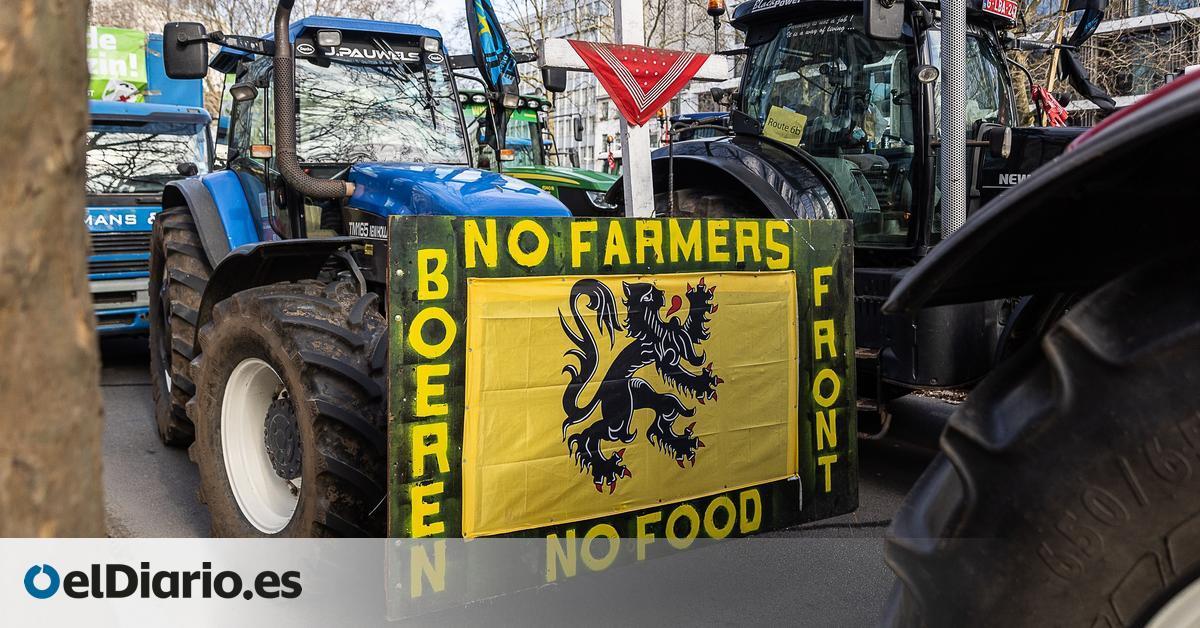
Combining the ambitious green agenda promoted by Brussels –and accepted in its basic objectives by the 27– with the economic interests of the affected sectors is becoming one of the main challenges for European governments. The environmental demands, which have the challenge of reducing emissions by 50% in 2030 and climate neutrality by mid-century, add to the tension due to increases in the prices of fuel or raw materials. With inflation that reached all-time highs in autumn and that has not let up yet, a perfect breeding ground for disaffection is being generated throughout the continent. Agrarian mobilizations, for example, have multiplied in recent times throughout Europe and the European People’s Party (EPP) has decided to rebel against the EU’s green policy to try to cushion the blow at the polls.
Environmental objectives, the last stumbling block of the impossible agreement between the EU and Mercosur
Further
Spain has been one of the scenarios of this positioning of the conservatives. The fear that Vox will take root in the agricultural electorate in Huelva has led Juan Manuel Moreno Bonilla to promote a regulation to pardon illegal irrigation. PP and Vox ignore scientists, experts and the European Commission itself, which has warned Spain of severe fines if it continues to pillage the aquifer and has recalled that the project that is being processed in the Andalusian Parliament goes in the “direction contrary” to the judgment of the Court of Justice of the EU and that it would suppose a “flagrant violation” of the same. The warnings led to an unprecedented reaction from the EPP, which pointed out as “partisanship” the College of Commissioners led by the conservative Ursula von der Leyen and, especially, the Environment Commissioner, Virginijus Sinkevičius, a member of a Lithuanian ecological and conservative party, by that Manfred Weber accused of putting on “the red shirt to campaign for Pedro Sánchez”.
That battle waged in Brussels is a sample of the position that the conservatives will have in the coming months, in which elections will be held in Greece, Slovakia and Spain. Weber himself stated this Thursday that the PPE is going to request a moratorium on all new legislation that has to do with the green agenda. “Let’s let our farmers work because the world needs food,” he said at a press conference on the occasion of the assembly held in Munich. The popular leader has also made it clear that his intention is to lower the goals that the European Commission has set regarding the use of pesticides.
The community government proposed a 50% reduction in the use of chemical pesticides in 2030 within the framework of the “farm-to-table strategy, which establishes a fair, healthy and environmentally friendly food system.” The PPE rejects it. “We want modern agriculture that uses fewer pesticides, but today we have an obligation to feed the world. With the effects of the war in Ukraine, we have a moral obligation to support farmers and tell them to grow food because the world needs food,” Weber argued.
The intention of the PPE leadership is to put that directive in writing. In a resolution whose draft has been advanced by the Financial Times, those of Weber make clear the “rejection” of that proposal because the “chosen reduction targets are simply not feasible and do not offer viable alternatives to farmers.” “Unsustainable cuts in plant protection products without realistic alternatives mean a significant cut in yields,” states the document, which is still subject to change. In the same sense, they reflect their opposition to the restoration of a fifth of deteriorated natural habitats and define this project as a “bureaucratic nightmare and a deadlock in planning, endangering food security, the production of renewable energy and crucial infrastructures.
The pressure of the EPP on the Commission occurs when the agricultural sector in half of Europe is on the warpath. European technocrats witnessed some of these mobilizations when just over a month ago nearly 3,000 tractors flooded the streets of Brussels to protest the Flanders region government’s plan to reduce nitrogen emissions from slurry from farms.
The European Commission gave the go-ahead this week to State aid from the Dutch Government worth 1,470 million euros to compensate for the closure of farms affected by the regulations to reduce nitrogen emissions. It was precisely the provincial elections in that country that set off the alarms of the parties after the Movimiento Campesino-Ciudadano, a conservative formation that defends the interests of the agricultural sector, became the most voted, achieving 15 senators out of a total of 75, which will mean a new balance for the Mark Rutte executive.
With this result in mind, the Polish government took a Solomonic decision to respond to the protests by unilaterally banning the import of Ukrainian grain. The ultranationalist Mateusz Morawiecki, who is facing the polls next fall, thus ended one of the star aid measures for Ukraine: the lifting of tariffs and quotas. The agricultural sector represents around 9% of the population in Poland. Hungary, the Czech Republic, Bulgaria and Slovakia followed suit. Farmers’ protests against the European Green Deal have multiplied and spread across the continent, from Ireland to Lithuania.
With these wickers, but at the same time with the effects of climate change wreaking more and more havoc and the threat of another record drought in Europe, the EPP intends to join the battle and put at risk some of the Commission’s proposals to achieve environmental objectives, ranging from the reduction of pesticides to the ban on the sale of combustion cars from 2035.
Source: www.eldiario.es

